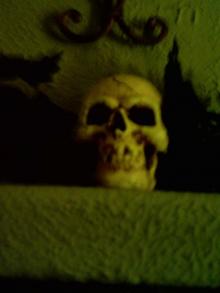- Home
- Richard Yates
Disturbing the Peace Page 2
Disturbing the Peace Read online
Page 2
“No need to shout, sir,” the waiter said.
“No need to be a little wise guy, either.”
“Look, mister: I don’t have to serve you.”
“Yeah? Well then how’d you like to kiss my ass, greaseball?”
“It’s all right,” Borg said, laying many dollar bills on the table. “It’s all right; we’re leaving. Here, John, I’ll take your suitcase.”
“Whaddya mean, I can’t carry my own bag? You think I’m a cripple?”
But the bag did give him trouble: he got it wedged in one of the plate-glass doors and said “Son of a bitch,” causing people to turn and look at him; then as they walked the passageway to Lexington Avenue he stopped and put it down several times, once nearly tripping a woman, because he said it was killing his hand and breaking the hell out of his leg.
He was quiet in the car as Borg crept through crosstown traffic, but when they’d begun the long ride down Seventh Avenue he began to twist and writhe against the passenger’s door and one hand flew up as if to shield his face. “Christ’s sake, Paul, will you watch your driving? Will you slow down?”
“Try to take it easy, John. I’m going as slow as I can.”
It was a busy evening at the St. Vincent’s emergency entrance – stretchers on the floor with orderlies or interns crouched over them, a middle-aged woman bleeding from the face and groaning on an examination table – but Borg found a partitioned alcove where a young man in white sat behind a desk, apparently in charge.
“Doctor, this isn’t really an emergency but my friend here’s exhausted; he hasn’t had any sleep for a week, and he needs sedation. Frankly, I think he may be going through some sort of nervous or—”
Borg could not afterwards remember how he’d finished that sentence: he was aware only of the doctor’s eyes blinking through thick glasses at one and then the other of them. Wilder had opened his collar and tie long ago; now he clawed them open further and so roughly that a shirt button fell and spun on the floor. When the doctor told him to sit down he dropped his suitcase with a crash and sank into the only seat available, a big old-fashioned wheelchair of varnished yellow wood that made him look very small and helpless, especially when it rolled backwards and was caught by an orderly who’d appeared from nowhere.
“Would you please step outside, sir?” the doctor said, and Borg was quick to obey. His feet hurt. He was hungry and tired and wanted to go home. All this would be over soon. “Oh, I don’t know how to thank you, Paul,” Janice would say. “I can’t imagine what we’d ever have done without you.”
The partition was thin. He couldn’t hear the words of the doctor’s interrogation or Wilder’s replies, but he assumed it was a routine interview for admission – name and age and occupation, next of kin, medical history, previous instances of insomnia – and then it all went out of control.
“. . . You’re God damned right I’ve been drinking. What the hell do you do when you can’t sleep, sonny boy? Eat fudge? Watch ‘The Late Show’? Pull your prick? Listen! Listen, you overeducated little snotnose, you faggoty little – Listen: I figured out a lot of things about myself this week. Things you’d never understand in a hundred years. . . .”
By the time Borg was back in the alcove there was a sound of splintering wood as Wilder stamped one shoe on the footrest of the wheelchair and broke it, and the orderly said “Easy, mister, easy.”
The doctor had stood up from his scattered paperwork, and Wilder was saying “I’ve been a turd under everybody’s feet all my life and I’ve just now figured out there’s greatness in me. There’s greatness in me, and if you don’t quit looking at me that way, if you don’t let me into this fucking hospital I’m gonna take your glasses and shove ’em down your fucking throat. Is that clear?”
Then the orderly had turned him around and wheeled him down a hall and the doctor was explaining to Borg that there were no facilities for him here, that in his judgment the only course was to take him to Bellevue and that an ambulance would be provided at once. “I’ll call ahead now,” he said. “They’ll be ready for you.”
And the next thing Borg knew he was cramped on a narrow bench of the ambulance with the suitcase between his legs. He had always thought that stretcher patients were carried face-up, but Wilder lay on his belly with the hands of three or four attendants holding him down, and he was still shouting in a monologue so nearly incoherent that only the words “fuck” and “shit” and “greatness” came through. In the dim pink and grey light Borg could see that his coat and shirt were rucked up to his shoulder blades; he pulled them down and rubbed the damp, trembling spine in what he hoped would feel like reassurance. “John,” he said, whether Wilder could hear him or not, “you wanted a good rest and you’re going to get it. Just relax now; you’re all right.” That was when the ambulance gained speed and its siren came on, growling low at first and rising to a scream as they swerved across town.
“Ow!” Wilder said over and over, as if the smooth ride were filled with bruising bumps and potholes. “Ow! . . . Ow! . . . Ow! . . .”
And Bellevue – or whatever part of the labyrinth of Bellevue they arrived at – was so bewildering that Borg’s own mind went briefly out of focus. He stood around with his mouth open like a fool’s, holding Wilder’s suitcase, until someone handed him a printed form headed CITY OF NEW YORK, DEPARTMENT OF HOSPITALS, showed him where to sign his name, where to put his home and office phone numbers and told him to write “friend” in the space marked “Relationship.” He did that quickly because they wouldn’t let him see Wilder until it was done; then he found he couldn’t see him anyway because Wilder’s arms were slung tight around the necks of two big orderlies who dragged him still shouting toward a closed elevator, where a third orderly waited with a wheelchair, and they not only forced him into it but strapped him in. When the elevator door slid open they shoved him inside, and across the back of the chair was the stenciled word PSYCHO.
“Look,” Borg said to the nearest white-coated man he could find. “Listen: what’s the procedure here?”
The man smiled, shrugged and spoke rapidly in what could have been either Spanish or Italian.
“Are you a doctor?”
“Me? No. Doctor over there.”
“This your bag, mister?” another voice said.
“No. I mean yes – wait – here, I’ll take it.”
Then he said “Doctor, excuse me, but I’m a little – What exactly is the procedure here?”
This man was very young too, like the one at St. Vincent’s, but handsome enough to play the romantic lead in some movie about a great metropolitan hospital. “The procedure? Thanks, honey,” he said to a nurse, or a nurse’s aide, who had brought him a hamburger and a container of coffee.
“You’re very welcome.”
“What I mean is,” Borg said, “could you tell me what they’re going to do with Mr. Wilder?”
“Wilder.” He set his coffee down, picked up a clipboard and squinted at it. “Oh, yes. And you’re the man who signed him in, right? Mr. Berg?”
“Borg. I’m an attorney.” And he pulled his coat straight as further proof of respectability. The warm brown smell of the hamburger was making him weak with hunger.
“Well, he’ll be treated like any other patient, Mr. Borg,” the doctor said with his mouth full. “They’ll put him to sleep, first of all.”
“And how soon do you think he might be released?”
“Hard to say. This is Friday night, and it’s the Labor Day weekend. The psychiatrists won’t be back till Tuesday, and it’ll probably be Wednesday or Thursday before they can review his case. After that it’s entirely up to them.”
“My God. I’d forgotten about Labor Day. This is – the point is I’d never have signed that paper if I’d realized – I mean this is really very – unfortunate.”
“I wouldn’t worry about it,” the doctor said around his chewing, spilling crumbs of meat and bread from his lips. “I’d say you’ve done the right thing. Look:
you’re an attorney; you deal with the police at all?”
“No. My clients are – No, I don’t deal with the police.”
“Well, okay; even so. You’ve seen the shape he’s in.” He wiped his mouth on one white sleeve and left a streak of ketchup. “Which is better? Having him safe in here for a while, or out walking the streets until the cops pick him up and book him for disturbing the peace?”
Chapter Two
He woke up soaked with sweat, breathing stale and fetid air. A naked light bulb shone in his eyes and he found he was in a steelframed bunk slung by chains from the wall, like a bunk in a troopship or a jail.
“… Everybody out,” a voice called, and there were other sounds: groans and curses, wretched coughing and hawking, a loud fart, the creak and bang of bunks being folded back and clamped against the wall. “Let’s go, let’s go. Everybody out.”
When he sat up a hand closed around his shoulder and rolled him onto the floor. He was wearing grey cotton pajamas that were much too big for him: the pants tripped his stumbling bare feet and the sleeves hung to his fingertips. Swaying and squinting under the lights, he rolled up the sleeves first, disclosing a loose plastic bracelet that read WILDER JOHN C. He bent over to roll up the pants but was kicked from behind and fell to his hands, and he looked up frightened into the angry face of a Negro in pajamas like his own.
“Watch your ass, man. This here’s the corridor. You got no business hunkerin’ down playin’ with yourself; get up and walk.”
And he did. Steel-mesh panels were being drawn across the folded bunks to prevent anyone from using them: this was indeed the corridor, the place for walking. It was yellow and green and brown and black; it was neither very long nor very wide, but it was immensely crowded with men of all ages from adolescence to senility, whites and Negroes and Puerto Ricans, half of them walking one way and half in the other, the dismaying variety of their faces moving into the glare of lights and then into shadows and then into the lights again. Some were talking to one another and some talked to themselves, but most were silent. He felt warm grit under his feet until he stepped on something slick; then he saw that the black floor ahead was scattered with gobs of phlegm. A few of the walking men wore dirty paper slippers, and he envied them; a few were smoking, with packs of cigarettes in their pajama-top pockets, which puckered the roof of his mouth. Then he saw that some weren’t wearing pajama tops but straitjackets, and he wanted to whimper like a child.
There were closed windows at both ends of the corridor, covered with steel mesh: the light outside was drab – either an early grey morning or a late grey afternoon – and there was nothing to see but air shafts and windowless walls.
Near the middle of the corridor stood a Negro orderly in hospital greens, and he hurried toward him with a mouthful of questions – Look: where’re my clothes? Where’s my money? Where’s a phone? What’s the deal here? – but when he confronted the man he felt small and shy and all he knew was that his bladder was about to burst.
“Excuse me,” he said. “Where’s the bathroom?”
“Over there.”
And he followed the pointed finger into a bright stinking latrine where men squatted on toilet bowls or stood jockeying for position at a long urinal trough.
“Now this here,” another orderly explained, “is your toothbrush. Way you can always tell is because it got your name on it. See that tape? Wilder. When you done with it, put it back here in this rack. Ain’t nobody gonna use this toothbrush but you, and you never gonna use nobody else’s toothbrush, understand? That way, nobody pick up no trench mouth or nothing like that. Understand?”
But nobody was allowed his own razor. The men stood four and five deep waiting to shave at a steamed-up mirror under watchful, official eyes.
“… Soon’s you done you rinse that razor and lay it on the shelf. Ain’t no use foolin’ with that razor; you can’t get that blade out. That razor’s locked …”
“… Showers for the new men only. Showers for the new men only. Not you, Gonzalez, you come on back outa there …”
There was no soap in the communal shower room and no way of regulating the water: the new men slid around on greasy duckboards and tried to clean themselves until each was given a towel in one hand and his own wadded pajamas in the other.
“Can I have slippers?”
“Ain’t no more slippers. Slippers all gone.”
And then it was back to the corridor with nothing to do but walk. He passed a locked door with a small wired-glass window and peered inside to discover a padded cell. Canvas mats of the kind used by wrestlers and gymnasts were hung from the walls and spread on the floor. It was vacant, but the one next door was occupied: a man in a straitjacket lay face down in it, as still as death, with a dark stain of piss around his thighs.
“… I don’t care! I don’t care!”
Both columns of walkers shrank aside to make way for the spectacle of a young white man shadowboxing down the middle of the hall. He was stripped to the waist and he’d neatly ripped off his pajama pants to the length of prizefighters’ trunks; he was bobbing and weaving, jabbing and hooking in a swirl of yellow dust motes.
“… Can’t you idiots understand? I don’t care! I want my father to see me like this!”
“All right, Henry; easy, now,” an orderly was saying, coming up from behind to put a hand on his shoulder, but the shadowboxer spun and faced him with both fists cocked.
“Don’t call me ‘Henry,’ you dumb black bastard – call me Doctor or I’ll break every fucking bone in your—”
“You ain’t gonna break nothin’, Doctor,” a second orderly said, and the two of them held his arms. Both orderlies were bigger than he; they had no trouble turning him around and leading him down the corridor. He didn’t struggle in their grip but his shouting rose until he sounded on the verge of tears.
“… God damn it, if I want my father to see me like this it’s none of your dumb, black, ignorant, motherfucking—”
“Your father iddn’t gonna see you no way, Doctor; come along easy now, ‘less you want Roscoe to shoot you out.”
“Yeah, yeah, shoot me out, that’s all you know. Big deal! Ah, you poor, dumb – Whaddya do? Go home and tell your wives, ‘Hey, baby, I got me a doctor today’? ‘Got me a real white doctor right in the ass’? Well don’t forget I’m naming both of you, and your little buddy Roscoe too, tried to send me up to Wingdale. I’m filing a mal – a mal – a malpractice suit against this hospital, and when the facts – when the facts are out you’ll all be …”
He was out of sight now, and out of earshot because of the laughter and jeers and catcalls that broke in his wake. Another Negro in greens was hurrying down the corridor with a hypodermic syringe; he stopped and squinted at it under a light, holding it high while he thumbed the plunger just enough to make a drop of liquid appear on the point of the needle, then he went on toward the shouting man.
“Go get ’im, Roscoe,” somebody called. “Fix ’im up good.” And there was more laughter as the columns began to move again.
Wilder felt a light nudge at his elbow and thought he heard a voice say, “Want to kiss me?”
“What?”
A remarkably handsome Negro boy was smiling there, wearing a turban made of his pajama top, gently swiveling his shoulders to display the beauty of his naked torso and holding his half-erect cock in his hand. “Do you want to kiss me?”
“No.”
“Oh, it’s all right. It’s all right. You can kiss me if you want, but only if you say ‘I love you’ first.”
It was time for breakfast. Double doors were opened at one end of the corridor and both columns became a jostling crowd.
“… All right, hold it; hold it now. Two at a time. Two at a time, or nobody gonna get nothin’ to eat …”
The sense of entrapment was even worse inside the mess hall: once you’d been shoved crouching and sidling down the narrow space between a long table and its high-backed, immovable wooden bench, ther
e was no way out. Wilder sat pressed between a toothless, ancient man and a fat boy whose wet mouth hung open as if in pain from the cramp of the table against his belly. Each of them received a plastic bowl of glutenous oatmeal with canned milk and a mug of lukewarm coffee, and Wilder didn’t know he was hungry until he’d dug into the oatmeal with a big tin army-surplus spoon. If he could eat, if he could drink this coffee and find a cigarette and a telephone, there might still be a chance of the world’s coming back to normal. But the old man couldn’t lift the shaking spoon to the reach of his gums without spilling it, and the fat boy picked up his bowl in both hands and plunged his face into it, slobbering like a dog as the porridge slid down his chest; then a shrill voice at one of the other tables rose to panic: “Lemme outa here, lemme outa here, lemme outa here …”
When the mess hall set him free at last he found that the men who looked the least insane had begun to congregate at the head of the corridor where there was a little ell facing the locked front door. On a high book-keeper’s stool beside the door sat a policeman – not a uniformed hospital guard but a real New York City cop, complete with badge and dangling nightstick and holstered pistol. He chewed gum steadily and talked to no one, not even the orderlies, and he wore the kind of sunglasses whose lenses were silver mirrors on the outside: if you tried to look into his eyes you saw only a double image of your own craning face. Even so, this seemed the best place to be: the place where rational things were most likely to happen.
“Hey there, Shorty. How’s old Shorty today?” The man who said this wasn’t much taller than himself, and he was ugly – a sallow face with close-set eyes and a big humorless smile full of bad teeth – but his pajama pocket bulged with cigarettes. “I seen you when they brought you in last night. Boy you was high.”

 The Collected Stories
The Collected Stories A Special Providence
A Special Providence Young Hearts Crying
Young Hearts Crying Easter Parade
Easter Parade A Good School
A Good School Cold Spring Harbor
Cold Spring Harbor Eleven Kinds of Loneliness
Eleven Kinds of Loneliness Disturbing the Peace
Disturbing the Peace Liars in Love
Liars in Love The Collected Stories of Richard Yates
The Collected Stories of Richard Yates Night Noises
Night Noises Disturbing the Peace (Vintage Classics)
Disturbing the Peace (Vintage Classics) The Easter Parade
The Easter Parade